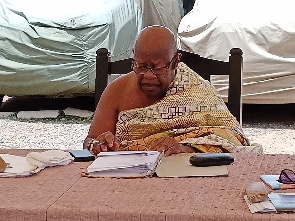 Paramount Chief of the Manya Krobo Traditional Area, Nene Sakite II
Paramount Chief of the Manya Krobo Traditional Area, Nene Sakite II
Correspondence from Eastern Region
Debates over resorting to alternative dispute resolutions (ADR) to fast-track Ghana’s judicial system have surfaced now and then.
Traditional authority remains one of the most revered ADRs to many where tribunals headed by chiefs, are resorted to by disputants.
Various factors including delays through case adjournment, use of complex, legal procedures, administrative and legal procedural challenges and the cost of seeking redress in formal courts among others account for the patronage of traditional courts.
In the Manya Krobo Traditional Area of the Eastern Region, the Paramount Chief’s Arbitration Tribunal headed by the Konor of Manya Krobo, Nene Sakite II is one of such arbitration bodies regarded by the people as less intimidating and characterized by the incorporation of informal processes that indigenes are accustomed to as the tribunal can accommodate people of various backgrounds.
Cases settled by the tribunal include civil cases such as marital disputes, land and boundary litigations, defamation of character, swearing of oaths and invocation of the gods by anyone on the other, theft, chieftaincy disputes, among others, which are adjudicated by the Konor and his tribunal.
The Konor of the Manya Krobo Traditional Area through customary law adjudicates on most cases brought to his court at his palace at Odumase-Krobo where he serves as a disturbance handler, taking corrective measures in conflict situations to restore law and order.
The Paramount Chief’s Arbitration Tribunal empowered by the native authority has since time immemorial and before the introduction of modern orthodox courts, existed to adjudicate on issues among its people.
Disputants dissatisfied with the ruling of the tribunal have sought redress from the formal courts.
The paramount chief in extolling the efficiency and credibility of the tribunal noted that none of its judgments during his reign has been dismissed by any superior conventional court where disgruntled persons sought review after the tribunal’s work.
“I’m very particular about the arbitration because, and I’m happy and I’m proud because in 25 years, all the cases that we’ve dealt with, no other court has ever turned aside cases that I have adjudicated…whether Supreme Court, Appeal Court or Circuit Court has set aside any of our provisions,” said Nene Sakite, describing the development as a major achievement.
Detailing the origin of the paramount chief’s arbitration tribunal, the Konor said, “We’ve been here even before the colonialists came and we’ve had our courts and everything, we’ve been here even before the colonialists even came and we’ve had our courts and everything, we were adjudicating cases for centuries before they came…so formal courts like supreme courts and appeal courts and all those [courts], they were just recent, our courts have been here for so many years dealing with issues in society,” explained the chief.
Aside from the civil cases, the paramount chief noted that the tribunal does not sit on criminal cases as such cases are handled by the police and courts.
Nene Konor said he was proud of the performance of the tribunal over the past two and half decades.
The purpose of the tribunal, the chief emphasized is to ensure peaceful co-existence among the people, adding that both plaintiffs and defendants have always expressed satisfaction over the arbitration body’s ruling.
He however stressed that the setup is not a court but only plays the role of an arbiter. “What we do here, it is not a court per se, it is arbitration so we seek peace more than anything else and sometimes when we get done, both the plaintiff and the defendant, they’ll kneel in front of us to thank us,” emphasized the chief, noting that cases brought before him were delivered expeditiously.
Cases brought before the tribunal are not only from within the Krobo area but from far and near including from Krobos abroad and non-Krobos from other jurisdictions in the country.
Underscoring the importance of the arbitration body in serving as an alternative dispute resolution body, the paramount chief stated: “We are very, very important in the system, without us, there’ll be chaos.”
Registrar to the paramount chief’s arbitration tribunal, Mr. Bah Sakitey emphasized the chief’s words that the tribunal does not sit on criminal cases but only on civil cases as an arbiter.
Among the powers of the tribunal is its power to revoke oaths and invocation of deities on others.
Mr. Bah Sakite explained: “We have the power to revoke the gods. We can revoke any god that is invoked on anyone because the deity is in the stool. If you’re found liable of oath swearing [on anyone], you’d be made to purge the oath.”
He furthered that even if the culprit is guilty of the offence for which a deity was invoked against him, rituals would be performed to revoke the curse.
At the end of every sitting, those found liable are made to pacify the other party either in cash or in kind. The registrar said defendants found liable to the accusations pay for the pacification which the tribunal grants based on the outcome of the adjudication process.
“We do pacification, we’ll pacify you. Customarily, some people use fowls, others use goats for the pacification depending on the degree of the offence,” Mr. Sakitey said.